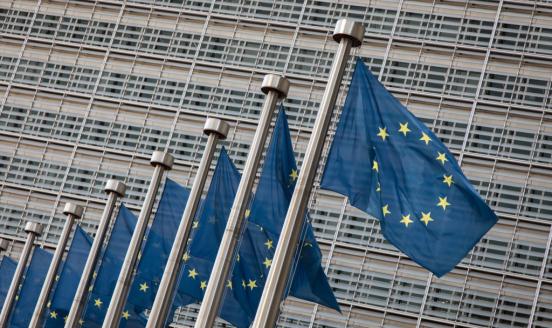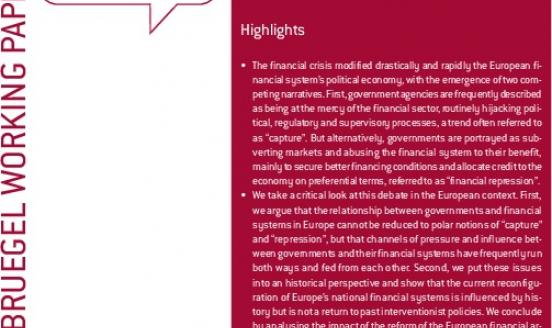The Weekender
Dear All, It has been an eventful week with financial instability in Europe over the last few weeks translating into very weak high frequency survey (
Dear All,
It has been an eventful week with financial instability in Europe over the last few weeks translating into very weak high frequency survey (PMI). A growth agenda is therefore probably urgent but the fiscal and monetary multipliers will remain extraordinarily low across the euro area so long as financial instability persists. This should therefore be addressed as a priority. The increasing capital injection for Bankia, the expansion in the activated guarantees of Dexia, the substandard recapitalization process in Greece all call for a more comprehensive response and certainly one that no member state alone can deliver.
Luckily, the “informal” European Council has been the occasion of bringing this discussion to the fore. It has remained quite superficial but it is the first time that HoSG have discussed the possibility of a banking union in such a clear language and evoked Eurobonds so precisely. President Von Rompuy has been tasked to prepare a report on the necessary steps to strengthen the monetary union including “eurobonds in a time perspective, a more integrated banking supervision and resolution, and a common deposit insurance scheme.” This is very encouraging although achieving deliverables is urgent and unlikely by June, in the meantime there are two challenges to keep in mind:
1. Banking Union, bail-in and the risk of another Deauville moment
2. Eurobonds but what Eurobonds?
Banking Union, bail-in and the risk of a new Deauville moment
It is somewhat reassuring to see that the many calls for a banking union are finally being heard. European policymakers will need to make progress quickly on a least 3 complementary and necessary dimensions:
i. A deposit guarantee scheme either through a backstop of national guarantee scheme (by the ESM for instance), or through a direct supranational guarantee scheme in replacement of existing ones (which is probably going to take longer).
ii. A resolution / restructuring framework. This will require some ad hoc involvement of existing institutions before a new, permanent one is created and probably lodged within the ESM (see my column Irish shadow in the Spanish deadend for more on this). In the short-term, the ECB has to be involved, the EBA and the Commission, all reporting directly to the president of the eurogroup for political accountability purposes. They would form the embryo of a European FDIC and should start their first case with Spain soon
iii. A truly supranational supervision framework building on the existing institutions but changing profoundly their current relationships, moving from subsidiarity to a clear hierarchical structure with appropriate governance and accountability mechanisms.
Yet over the last two years or so, given the absence of political will on these questions (in fact outright rejection), the European Commission has spent more time working on “automatic” resolution mechanisms that would basically achieve orderly resolution and recapitalization through the use of so-called bail-in (basically the orderly conversion of subordinated debt into equity at times of crisis).
Commissioner Barnier seems ready to publish imminently a long awaited Communication on the matter. The Commission has been somewhat forced to focus on bail in as a substitute to a banking union, in the absence of political progress and traction on other key aspects of crisis of resolution which it has worked on extensively (see here).
The major risk is that financial markets perceive the bail-in as an essential building block of the new resolution framework. I personally think it should be an essential element to protect taxpayers resources in the context of banking crisis but it is only a complement to the elements listed above and not a substitute.
As far as timing is concerned, the reality is that bail-in instruments are important to deal with the future banking crisis in Europe but they come too late to deal with the current one (which doesn’t mean subordinated creditors cannot and shouldn’t be haircut if necessary). Hence, the appropriate timing is to clarify first the banking resolution framework, the deposit guarantee scheme and then the supervision and the bail in provisions, not the other way around.
This order is important and is very similar to the discussion on CACs in the case of fiscal crises and sovereign debt. It is true that CACs can be a very useful instrument, but introducing a conversation about CACs at Deauville in 2010 hasn’t done much to solve the current crisis and has probably made financing conditions for sovereign more challenging. It is quite possible that the bail-in discussion, although very important in and for itself, could have two undesired consequences: pollute the political discussion on the shape and form of banking union, create more harm than good by making funding conditions for banks more difficult than they already are.
Eurobonds but what Eurobonds?
With growing intellectual and political acceptance that Eurobonds are part of the solution to the current crisis, Germany seems increasingly cornered. Yet the debate has been sufficiently vague and has consistently ignored important details of the many different proposals such that Germany still holds an important advantage in the sense that if it accepts the idea of Eurobonds it can largely choose the type of Eurobonds it wants.
In a forthcoming research, we look at the different proposals and conclude that the different Eurobonds proposals discussed in policy circles have important idiosyncratic merits that make it useful to think of them as complement rather than substitute. In this case, the important and complicated exercise is to combine and sequence the different proposals intelligently and effectively.
I attach slides outlining two potential paths slides outlining two potential paths (there are many others). The first one, is the one that Germany could try to sell to its partners. It builds largely on the sachverstaendigenrat’s European Redemption Fund (which the German government had originally rejected). The proposal has received since clear backing by the opposition (SPD and Greens) and is the one proposal that the European Parliament has strongly endorsed.
I contend that this is not the only avenue and that there are potentially other, more effective ones. This seems to be the view of Hollande, who made it clear during his press conference on Wednesday: “Moi j'ai une autre conception, les Eurobonds (…) ça peut être l'occasion de mutualiser non pas une dette passée mais une dette future pour permettre à des Etats (…) de pouvoir accéder plus facilement au marché”.
I suspect Hollande’s position would be closer to the second path outlined, which builds on project bonds and on eurobills as first steps towards Eurobonds. There will therefore be a very intense debate not only at the coming European Council but also during the subsequent ones about the exact nature, shape and form of common debt issuance in the euro area.
Happy to have your thoughts as usual,
Shahin Vallée


